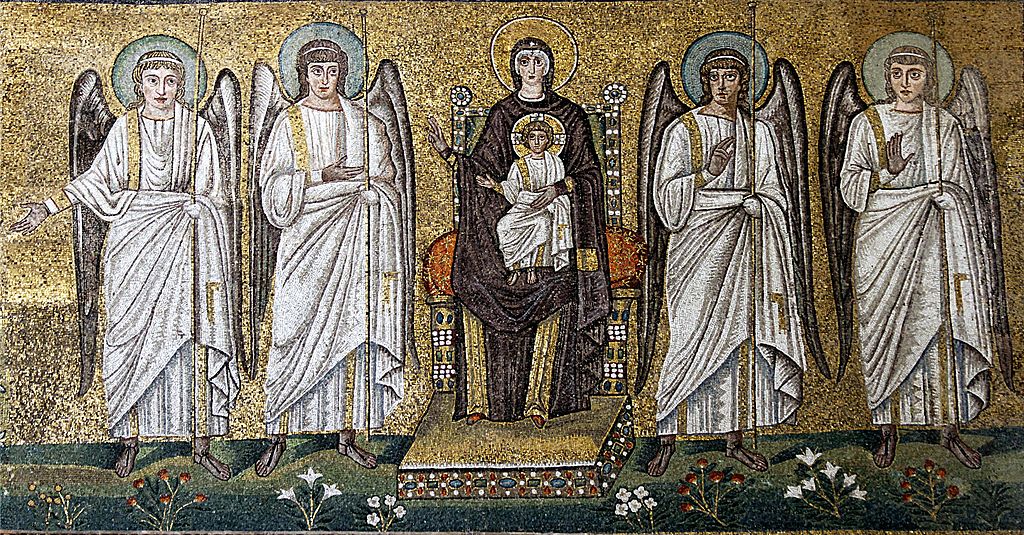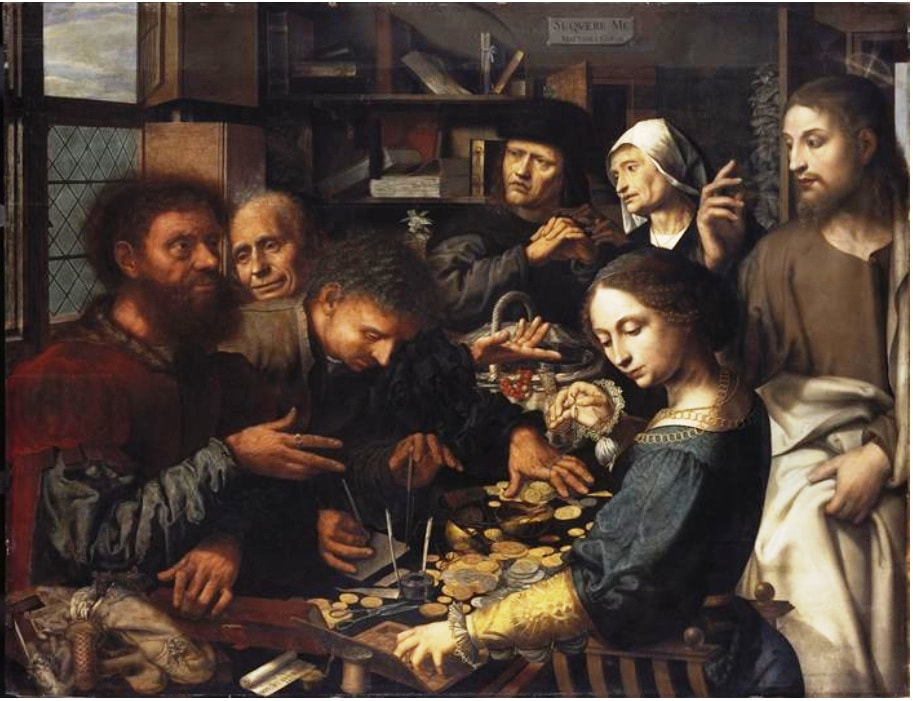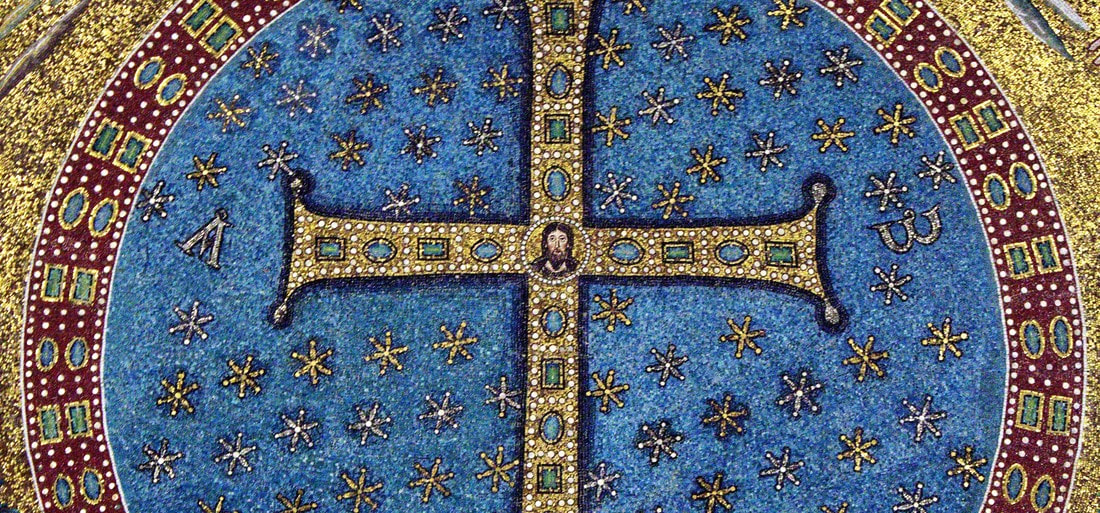|
Mosaic of Madonna and Child with Angels in Sant'Apollinare Nuovo, Ravenna, Italy, via Wikimedia Commons September 29, 2017
The celebration of this day draws me to worship. It draws me to the altar where we join our voices “…with Angels and Archangels and all the company of heaven,” singing praise and glory to God. From Luke’s account we hear of the song of the heavenly hosts, “Glory to God in the highest heaven, and on earth peace among those whom he favors,” familiar to us as the beginning of the Gloria in excelsis. Even the antiphons or refrains for the various canticles and psalms appointed for today’s feast direct us to an attitude of worship. One ancient example rings out, “Angels and Archangels, Thrones and Dominions, Principalities and Powers, Virtues of the heavens, O praise the Lord of heaven, alleluia.” To worship is to give “worth” to something, as in worth-ship. That to which we give worth is what we worship, and the call of faithfulness is to give ultimate worth to God. This “worth-giving” is characterized by praise, honor, joy, and I trust a spirit of playfulness, even foolishness. It is the poet Annie Dillard who admonishes us that in worship we ought to prepare by donning crash helmets. Of course, worship is not only to happen in a set-aside sacred space. It can happen anywhere, even as all the company of heaven is present everywhere and thus all creation is sacred. I remember a glorious moment some years ago in the Maine woods, walking the shore of a lake, gazing upon a lunar eclipse at midnight and singing out loud a psalm of praise. I recall standing at a hospital bed with a dying friend, family gathered round, and a profound sense of a community present “seen and unseen.” Another time, standing before giant tortoises in the Galapagos Islands, I found myself spontaneously praising and giving thanks to God for his imagination manifested on this earth, our island home. My hope for you today in your ongoing life and ministry is that you will find places of wonder and the time needed to adore the God of infinite love and mercy. Join the conversation that is already taking place among all the company of heaven, as we join as one to sing in an ancient antiphon, “The heavenly host extol the Son of the Most High; to him Cherubim and Seraphim continually cry, Holy!” Bishop Skip The Calling of St. Matthew by Jan Sanders van Hemessen, 1536, via Wikimedia Commons September 21, 2017
We remember and celebrate this day the call of Matthew by Jesus. In Matthew 9:9 we read, “Jesus saw a man named Matthew sitting at the tax collector’s booth.” Perhaps the most startling words in the entire account are those that indicate Jesus “saw him.” It would have been easy for Jesus not to see Matthew. It would have been more efficient to walk on by and not bother. After all Matthew was a tax collector: a collaborator with the Roman government and understood as an extortionist who was getting rich off of his own people. Furthermore, we know that tax collectors were abhorred by the most pious of Jewish groups, the Pharisees. Yet Jesus did see Matthew and dared to call him into his circle of disciples in order that he might follow. Who do we not see? Who would it be easy to walk on by, not recognize or acknowledge? Who do we choose not to value? Often when disasters strike such as in hurricanes, or even in our difficult conversations regarding immigration, it is precisely those who are too often the unseen who are suddenly exposed, particularly the poor. It is my hope that in our faith communities we are working very hard to see as clearly as Jesus sees and draw into his circle of care those to whom we need to respond, in word and in action. As Matthew 9:13 reminds us quoting Hosea, “I desire mercy, not sacrifice.” Our religious devotion and our life as a Church mean little to nothing unless we too are willing to see as Jesus sees, with mercy, as we respect the dignity of every human being and act accordingly. Bishop Skip Detail of a 6th-century mosaic in the apse of the Basilica of Sant' Apollinare in Classe near Ravenna, Italy, via Wikimedia Commons September 14, 2017
“And I, when I am lifted up, will draw all people to myself.” John 12:32 John’s Gospel understands Jesus’ self-offering on the cross as his exaltation. Thus he is “lifted up” as on a throne. An instrument of death that was meant to be a political statement of Rome’s power, that was meant to humiliate and destroy, becomes in the hands of God an invitation of total love, mercy and forgiveness. Today’s feast presents us with an opportunity. We can, once again, claim our center as we are reawakened to the glory of the cross. It is there we discover the definitive statement of who God is in his very nature – the desire to draw all people to himself. In that act on the trash dump of Golgotha of all places, is a proclamation of pure love. Do not mistake this for a passive God who is waiting for us to find him. Jesus taught us of a God who will not stop searching until we are found. God’s passion is you. Too often in history the Church has done a lot of grumbling about “sinners.” Nothing new there. Welcome to humanity. God’s emphasis, however, seems to be unmitigated joy by partying with us as we are found. So it is that we celebrate Eucharist. The cross-event reveals with stark clarity the very nature of the activity of the divine love and manifests its character as directed to the welcome of all people. No exceptions. It is through the cross that we learn that God is love. The Letter to the Philippians, as it echoes Isaiah, understands the cross as the reclaiming of the universe to God’s sovereignty and glory. It is for the healing of the nations. It is also the vindication of Jesus who refused to regard equality with God a thing to be exploited, placing himself at the divine disposition. As in Jesus, so it is our call to give ourselves to the obedience of God’s self-offering, demonstrating our willingness as God’s people to empty ourselves, take on the form of a servant, lay down our lives in order to give life, all out of a deeply developed and tended life flowing from a relationship with the living Christ. The cross shows us that the way to God is the way of self-giving love. The way of God’s love is the way of the cross, drawing all people to God’s very self. Bishop Skip |
Bishop Skip AdamsThe Right Reverend Gladstone B. Adams III was elected and invested as our Bishop on September 10, 2016. Read more about him here. Archives
December 2019
Categories |
Copyright © 2024 The Diocese of South Carolina
P.O. Box 20485, Charleston, SC 29413 - 843.259.2016 - [email protected]
P.O. Box 20485, Charleston, SC 29413 - 843.259.2016 - [email protected]




 RSS Feed
RSS Feed